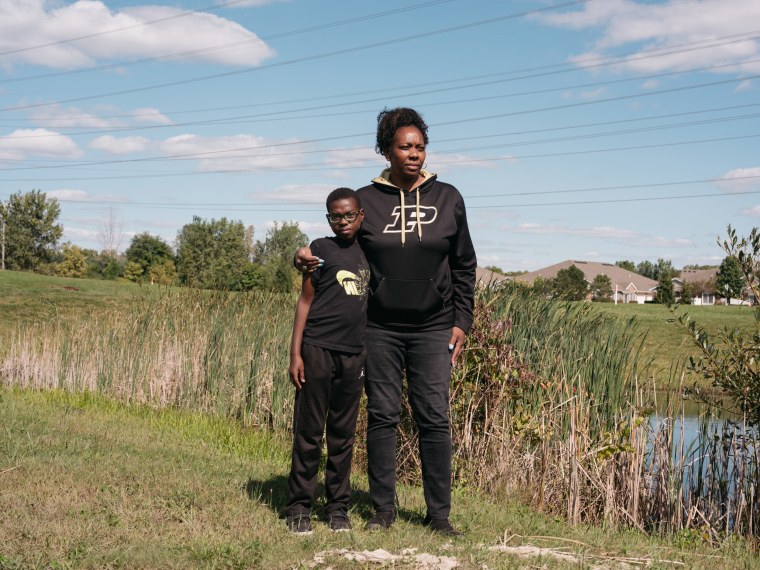DETROIT — A few days before the start of the eighth grade, Jonah Beasley considered the risks he'd face when he walked back into the classroom and summed them up in stark terms.
He could get Covid-19 from a classmate or a teacher, he said, and "if I get it, I'll probably die."
A veteran of two heart transplants, Jonah, a soft-spoken teen who loves football and basketball, takes medicine that suppresses his immune system. He has a long list of health issues that his parents initially thought would force them to choose virtual instruction this year.
But Jonah's lengthy hospital stays have already put him behind his peers academically and socially, said his mother, Peggy Carr-McMichael. He's 15, two years older than most of his classmates. And Carr-McMichael saw how difficult it was for him to focus on his schoolwork and speak up during video classes last spring after the coronavirus closed schools.
That's why Jonah and his parents decided on the hybrid option at his school, Metro Charter Academy in Romulus, near Detroit. He would go in person two days a week, getting support from a counselor and a special education teacher, and spend the rest of the week online.
It seemed like a good compromise, Carr-McMichael said. But as she pulled into the school parking on Sept. 8 to pick up Jonah and his younger brother from their first day of school, she admitted to doubts.
"Last night, I was kind of tossing and turning, like, 'Oh, my God. I hope this is the right decision,'" she said as she navigated the school pickup line. "I just hope people don't send their kids to school sick."
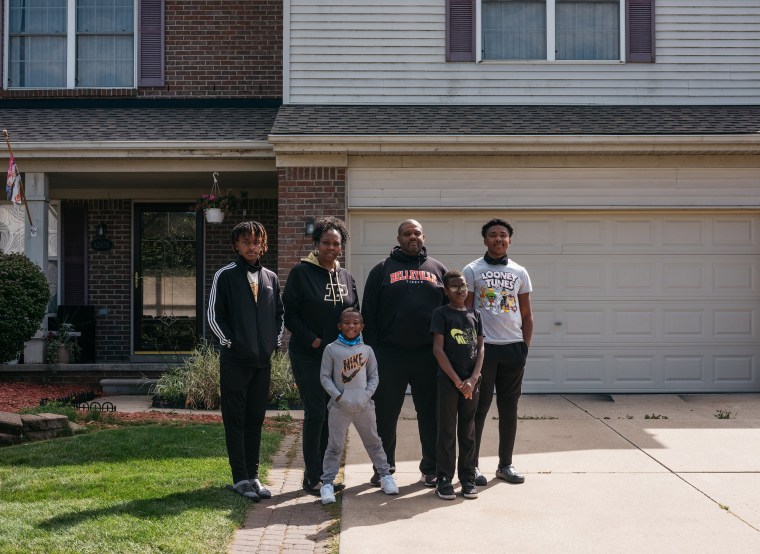
With the Covid-19 pandemic still spreading around the country, parents everywhere have had to make impossible choices this school year, weighing the health of their families against significant consequences for children who lose ground in school.
The stakes of those choices are particularly high for students with special needs, like Jonah, and for children in cities like Detroit, where the vast majority of families are Black or Hispanic — communities that have been pummeled by the nation's highest Covid-19 death rates and by the legacy of struggling, under-resourced schools that have long made it harder for their children to succeed.
Even as classes have begun and as families have started to adapt to the challenges of this unusual school year, many parents who live in and near cities like this one are continuing to second-guess the decisions they made.
NBC News began following several Detroit-area parents during the final weeks of summer as they weighed their options for school.
Among them was Carr-McMichael, who, in addition to Jonah and his younger brother, has two high schoolers going into the classroom five days a week.
Full coverage of the coronavirus outbreak
Another mom, Geneva Johnson, decided that online instruction was the safest choice for her four children — but she made it through only four chaotic hours before messaging her children's counselor with an urgent plea to change her mind.
A third mom, Marva Walker, has so far stuck with her decision to keep her three daughters in virtual classrooms. But she's been dragging herself home from her overnight shift in a transitional home for people coming out of jail or rehab, only to spend hours troubleshooting technical glitches for her girls. She's also attending college remotely. And she's not sure how long she can keep it up.
"It's so frustrating," she said at the end of the first week of classes, detailing dropped connections and miscommunications. "I'm not sure what happens if we're not able to hack it."
The first day — and the last
As the school year approached, Johnson agonized over her options.
She had dropped out of school in the 11th grade and abandoned her plans to become a nurse. Now, she said, she's determined to pave a better path for her children.
"They are not about to fall behind. I refuse to allow that," she said. "Living in the 'hood, poor, there's a lot at stake."
Her children lost ground after the virus closed schools in March, she said. Her youngest, Riley, a first grader, still can't write most of his letters. He struggles with reading. She wants him and his siblings in a classroom where they can get socialization and attention. But she also knew people in her neighborhood on Detroit's west side who died from the virus. She knew of children who'd come down with dangerous complications. She worried about people in her family, including Riley, who has asthma.
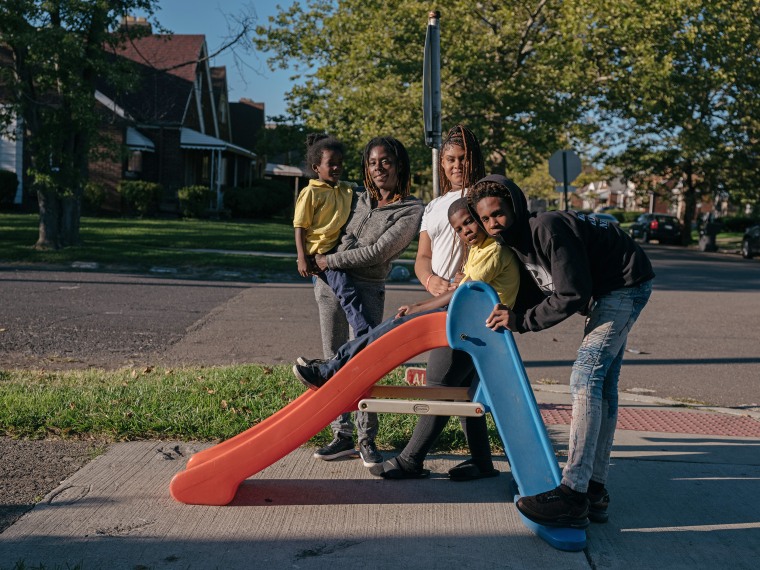
When she learned that schools in Detroit's main district planned to allow as many as 20 students in a classroom, she decided to keep her kids home.
"They're not going to be able to keep them away from each other," she said a week before classes began. "I can't chance that. Not at all."
She felt good about her decision — until the first day of school arrived.
Johnson, who had taken the week off from her job as a medical transport driver, had planned to get up on Sept. 8 and get her children connected with their classes. In addition to Riley, she has three others at home: Erron, a second grader; Elijah, an eighth grader; and Jaliyah, a high school freshman.
She dressed the younger two in their yellow school uniform shirts, even though the school didn't require them.
"I wanted them to be ready," she said, "to know 'this is what I have to do to be ready for school, whether I'm going out of the house or not.'"
But her plans were thrown into turmoil by a robocall telling her she needed to come to her children's schools to get books and materials. Worse, the call didn't come from a school where she thought her children were enrolled. The district — without telling her — had apparently responded to a transfer request she'd made months earlier and moved at least one of her kids to a different school, but she wasn't sure which child.
Sorting out the confusion wasn't easy. It took visits to four different schools and temperature checks at four different doors to get the right books from the right schools.
"This is the first day of school blues for real!" she said as she drove through the steady rain that drenched the city that morning.
By the time Johnson swept through the door of her family's bungalow, it was nearly 10 a.m. and her children were two hours late for school.
She quickly got to work, handing Jaliyah the books and logons she needed to access her classes, then trying to fire up the three laptops she'd lined up on a desk for her sons. But browsers needed updating. Passwords didn't work. Elijah's computer showed him still enrolled at the wrong school, and, as she bounced from one laptop to the next, the boys were getting impatient.
"I know, baby. I'm ready for you to work, but we've got to get this stuff situated," she told Erron as she tried to re-enter a password that wasn't working.
By the time Johnson got Riley connected with his teacher around 10:30 a.m., his class was about to break for lunch; his camera was facing backward, getting video of the wall, instead of his face; and Riley was confused about where to look on the screen.
"Mommy, I don't see my class," he said.
She didn't connect with Erron's class until 11 a.m., and by then, live instruction appeared to be over. She found a worksheet on rhyming words that Erron needed to complete but she couldn't figure out how to submit his answers.
"I'm sitting here going crazy!" she said.
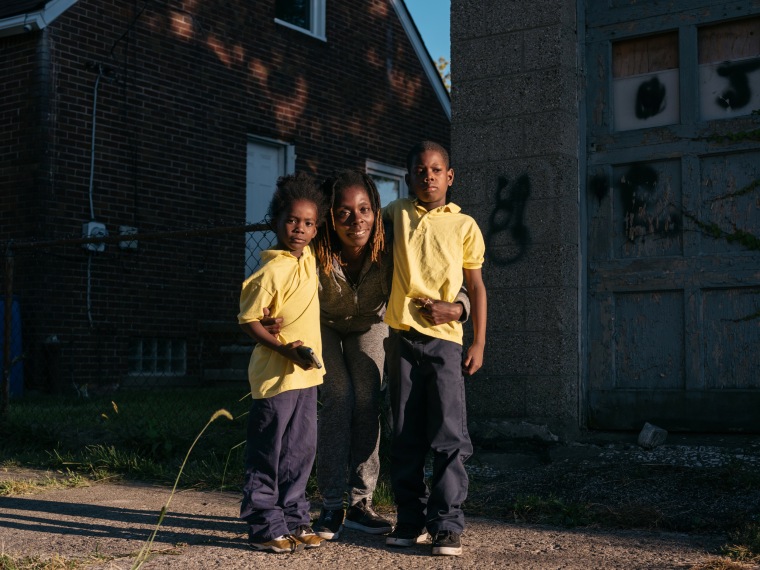
Meanwhile, the noise in the family's living room was making it difficult to focus. A TV blared. Elijah and Jaliyah had accessed the list of students in their classes and were calling out details.
"I know everybody in there!" Elijah said.
Johnson's sister had come over to help, bringing her 4-year-old son, who was playing a video game on a phone that piqued Riley's interest.
"Pay attention to what you're supposed to be focused on, Riley," his mother admonished. "That's what you have to do in school."
By noon, everyone's nerves were fried.
"This is irritating," Elijah said. "The whole pandemic is irritating."
And Johnson had had enough.
"This is the first and last day of home school for them," she said as she sent a message to the counselor at Detroit's Mackenzie Elementary-Middle School asking whether the face-to-face option was still available for her boys.
"We can't do this," she said. "Not with these little ones, 'cause it's a lot going on."
She's still worried about the virus, she said, but she knew that the following week, she'd be back at work, her older kids would be stuck helping the little ones, and no one would be able to learn.
"If they get sick, I'll have to deal with it," Johnson said. "My patience for home-schooling has left the building."
'We'll see how the next week goes'
When the Detroit Public Schools Community District asked parents to make a choice about school, most of them — 80 percent — chose the district's virtual option over face-to-face instruction, said Chrystal Wilson, a district spokeswoman.
The district asked parents to commit to their choices for at least nine weeks, but it is trying to accommodate families' evolving needs, Wilson said. "We know that circumstances do change."
Wilson doesn't know how many parents have requested a switch, but the district is more concerned about kids who aren't getting any instruction at all.
Superintendent Nikolai Vitti told the school board last week that 1 in 5 students didn't show up the first week of school, according to Chalkbeat Detroit, a nonprofit education news organization. That's an absence rate much higher than in a typical year and one that Vitti called one of the greatest threats facing the district.
Walker, who helps her three daughters with online instruction after working an overnight shift, made sure her children weren't among those marked absent.
She knows from experience what happens to kids who miss school. She started skipping herself when she was in high school and dropped out before she earned a diploma.
"It was just easier for me to not go to any classes," she said.
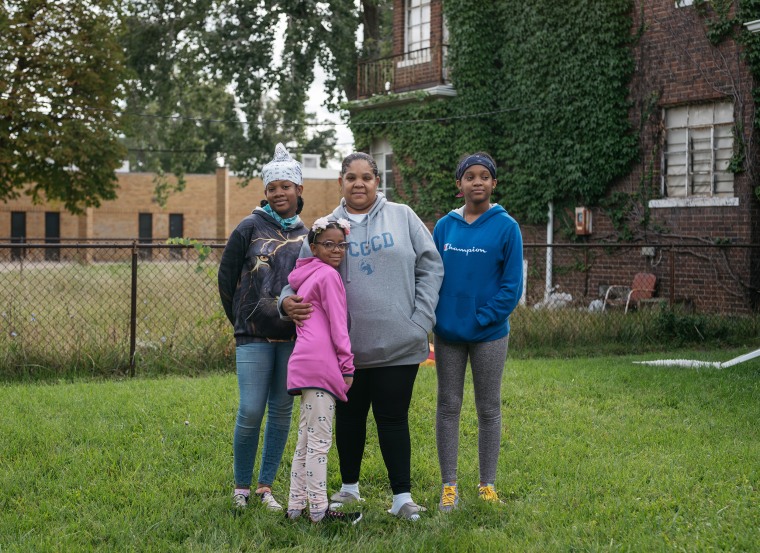
It wasn't until she saw her son, who is now 25, graduate from high school and college that she went back for her GED certificate. She wanted her daughters to see her commitment to education and hopes to earn a social work degree, then work in schools, giving kids the support she needed as a child.
Her experience weighed on her as she considered options for her daughters this year, said Walker, who lives a few blocks from Johnson and also has children in the city's main district. She chose online because her youngest, Mackenzie, a fifth grader, has asthma, but she worried that her ninth graders, Myia and Mia, would lose interest if they spent their first year of high school at home.
"I really want them to be able to experience going to high school in the building, connecting with new people, friends, developing personal relationships with their teachers," she said.
She's especially concerned about Myia, 14, who has dyscalculia, a learning disability that affects the brain's ability to acquire math skills. Myia repeated the fifth grade and began to catch up in middle school only with one-on-one intervention from a special education teacher.
Choosing online for Myia "was a really, really, really hard" decision, Walker said — one that's only become harder these last two weeks as she's seen her children struggle with school-issued laptops that won't keep a charge, screens that freeze, audio that drops.
"It's frustrating," said Myia, who wants to become a pediatrician. "I get booted out of class, and when I come back, we're already doing an assignment and I don't know how to do it."
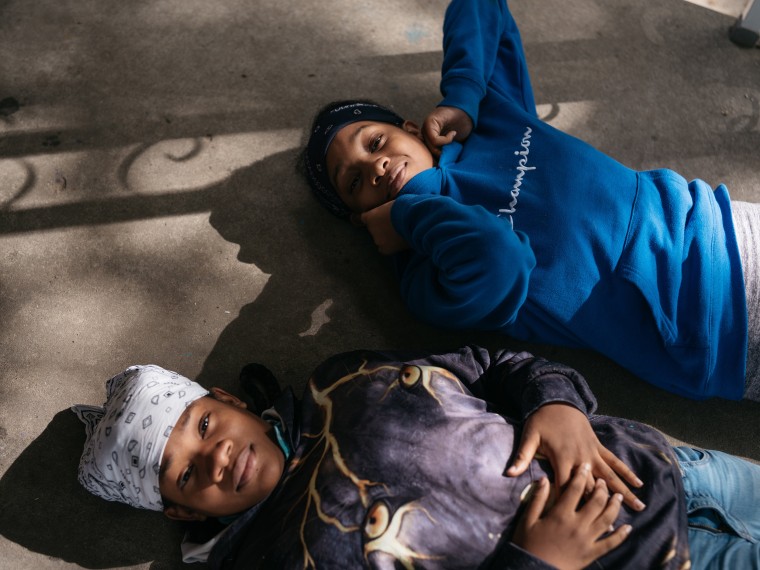
Walker, whose husband works mornings, has to manage it all on little sleep after working through the night. On her days off, she wakes at 3 a.m. to do her college coursework.
It's been so difficult that Walker said she's now debating sending the two older girls to a "learning center" in their school — Benjamin Carson High School of Science and Medicine — where they could take online classes but have more support.
That would be easier, but it might be too scary, Myia said. "I might be too worried about kids' being sick or standing by me or students' not wearing a mask."
By the second week of school, the technical problems hadn't gotten any better, Walker said, but teachers had at least become more accommodating.
"We'll see how the next week goes to determine if we can handle it a little longer," she said.
'We're just praying that nothing happens'
At Johnson's house, no one regrets pulling the plug on online learning for the boys.
Johnson's daughter, Jaliyah, is still running into technical glitches with her online high school classes, but at least she now has the house to herself.
"Nobody's trying to talk to me while I'm doing it," Jaliyah said.
The school bus now comes every morning for Riley, Erron and Elijah, and Johnson has made peace with her fears about the virus.
So few parents in the boys' school chose the in-person option that Riley has only eight students in his class, she said. Erron has only 10. She reminds them to wear their masks and to avoid rough play.
"I had to trust in my heart that my kids are going to follow what I taught them," she said.
Download the NBC News app for full coverage and alerts about the coronavirus outbreak
For Carr-McMichael, sleep has gotten a little easier as Jonah and his brothers get used to being back in a classroom. She panicked when she saw pictures of a crowded high school hallway on the news, but her two high schoolers assured her that the hallways at their school, Belleville High School in the Detroit suburbs, are fairly empty. Students have been good about wearing masks and walking in lines at the edges of the hall, Carr-McMichael said.
She believes in-person classes are the best choice for Jonah because falling even further behind in the eighth grade would make it harder for him to graduate from high school and achieve his dream of becoming a police officer or a doctor.
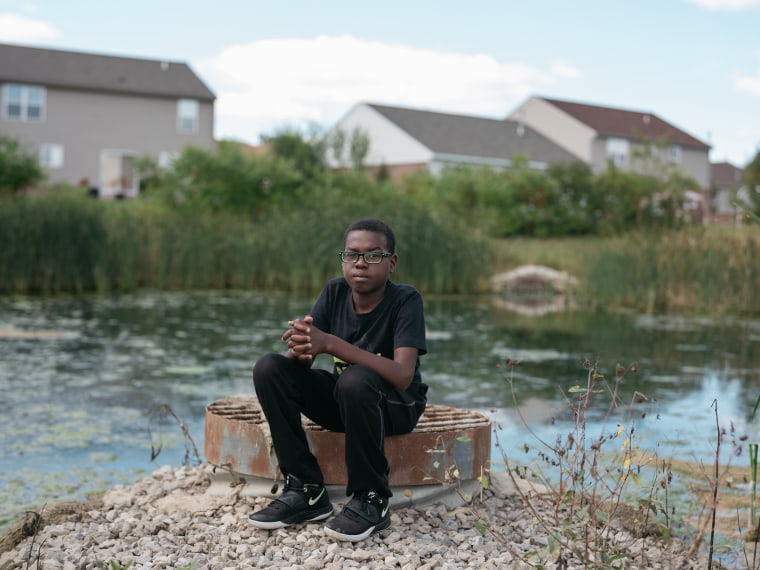
"This is a big year for him," Carr-McMichael said. "We don't want to hold him back another year."
But as Jonah gets ready for school in the morning, Carr-McMichael has noticed that he moves slowly, as though he's distracted. She wonders whether he's scared, but when she asks him, he says he's fine, she said.
When a reporter asked Jonah the same question over the phone during the second week of school, however, he didn't answer right away. He paused as the line went silent. When he finally spoke, his voice sounded far away.
"Kind of," he said when asked whether he was scared. "A little."
Still, he said, he's glad to be in a classroom two days a week.
"I get to see my teachers all the time and my friends — well, some of my friends," he said, noting that many of his peers are going to school online. "We can talk about sports and stuff."
Casual chatter like that isn't possible online, he said, because "it'd be a lot of people."
Carr-McMichael, who works as an administrator in a suburban district that is offering classes only online, said she's trying not to dwell too long on the possibility that Jonah could get an infection that he'd struggle to fend off.
"We're just praying that nothing happens," she said. "We'll just have to see how it goes. If it's too bad, I'll pull him. I'll make a change."
